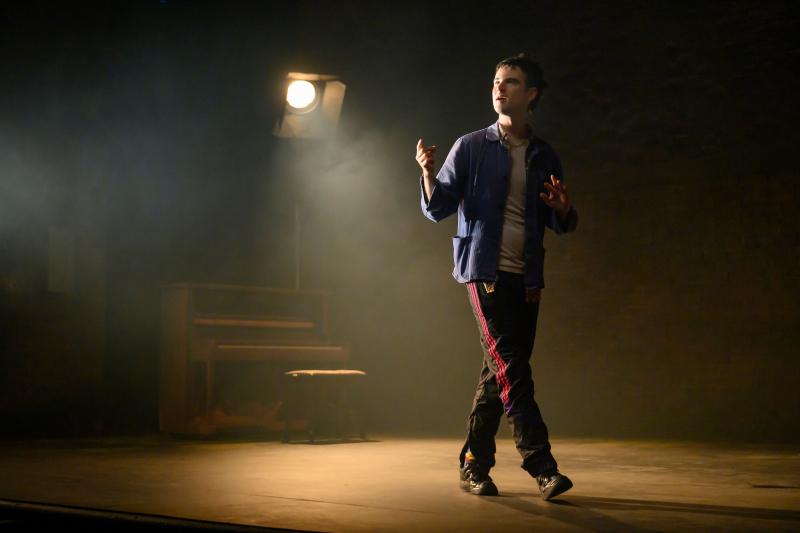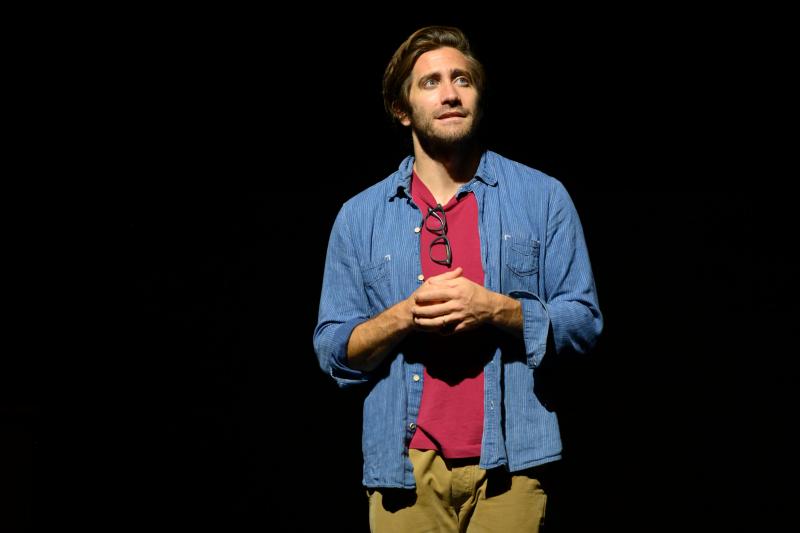Review: Tom Sturridge and Jake Gyllenhaal Bring Simon Stephens and Nick Payne's Achingly Human SEA WALL/A LIFE To Broadway
The double-bill of solo plays about tragedy and grieving transfers from The Public
"As terrifying as anything I've seen," is how a young fellow describes the natural phenomenon that gives playwright Simon Stephens' solo piece SEA WALL its title.

(Photo: Richard Hubert Smith)
"I thought it was a gradual slope," Alex explains, while describing his first scuba diving experience, unprepared for the sight of how the ocean's floor just suddenly drops down hundreds of feet.
That sudden, terrifying shift is an apt bit of symbolism for the first of two extraordinarily touching and achingly human monologues that comprise Sea Wall / A Life, a beautifully acted double-bill directed with delicate sensitivity by Carrie Cracknell.
Transferring to Broadway's Hudson from a Public Theater run earlier in the year, the production hasn't lost a bit of the heart-pulling intimacy that left audiences silently fixed on every word both times this reviewer has attended.
Tom Sturridge, in an emotionally complex and deeply sympathetic character study, plays the narrator of SEA WALL, followed by Jake Gyllenhaal as the more convivial and humorous storyteller of Nick Payne's A LIFE. Both portrayals of a man struck by personal tragedy, and how they are currently handling the grieving that follows, are performed directly to the audience in front of the imposing brick wall of designer Laura Jellinek's set.
Sturridge's Alex is already on stage when audience members enter, calming his nerves with a beer and looking through old photographs. Although there's a sincere, innocent boyishness that shines through when he describes the period when he and his wife were preparing for the birth of their daughter, he is a tense young man given to dart about aimlessly, sharply switch gears mid-sentence, or just helplessly stare out.
It was an event occurring during a seaside family holiday as guests of his father-in-law, a retired British military man, that has left him with, as he puts it, a hole running through the center of his stomach.

(Photo: Richard Hubert Smith)
As played by Gyllenhaal in A LIFE, Abe appears, at least on the surface, to be adjusting better to his loss. He even offers a bit of philosophy on the matter.
"I remember reading somewhere," he recalls, "or maybe someone telling me about this idea that there are three kinds of deaths. The first is when the body ceases to function. The second is when we bury the body, or I guess set it on fire. And the third is the moment, sometime way in the future, when our names are said, spoken aloud, for the very last time."
Abe may someday very well be the one who speaks his father's name for the last time and he wonders who will do the same for his daughter, as he alternates descriptions of preparing for his hospital-bound parent's death from heart disease with preparing for his child's birth.
Though taking place years apart, both life-changing experiences force a sharp adjustment to his self-identity, as a son to one and as parent to the other, converging during periods when both father and daughter are nearly completely dependent on him.
In contrast to Alex, Abe tells nearly his entire story standing under a fixed spotlight. His tale is less eventful than Alex's, dealing with a more-or-less expected life cycle, and as such it's the more universal of the two.
When Abe is looking for a frank answer as to how much his father knows about the seriousness of his condition, he's frustrated by a doctor's vague reply, "We try to operate within a culture of optimism."
And yet, that culture of optimism is just the comfort Payne provides at the end of an emotional theatre-going experience, through Abe's connection with a popular song that most audience members will know, and perhaps even Alex can take comfort from.


